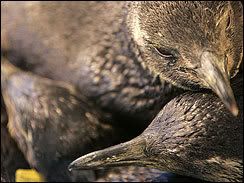 More than 1000 juvenile Magellanic penguins have washed-up either dead or dying along the Brazilian coast and as far north as Natal in Rio Grande do Norte, 3000 km north of Sao Paulo. IFAW (International Fund for Animal Welfare - www.ifaw.org ) deployed a team of penguin rehabilitation experts to assist local animal centers that are handling penguins for the first time.
More than 1000 juvenile Magellanic penguins have washed-up either dead or dying along the Brazilian coast and as far north as Natal in Rio Grande do Norte, 3000 km north of Sao Paulo. IFAW (International Fund for Animal Welfare - www.ifaw.org ) deployed a team of penguin rehabilitation experts to assist local animal centers that are handling penguins for the first time.
"This event appears to be a natural occurrence and has been seen 2 or 3 times in the last 20 years, resulting in the death of thousands of birds. What really took us by surprise this time is the huge increase in numbers," said Valeria Ruoppolo of IFAW.
The Magellanic penguins (Spheniscus magellanicus) breed in large colonies in southern Argentina and Chile and migrate north as far as Southwest Brazil between March and September. According to experts, there is a flow of warmer water (1C higher than normal), which has caused the juvenile penguins to keep going north, past their usual range, where they are unable to find adequate food. Almost all of the penguins being found on beaches in northeastern Brazil have been juveniles and since they are starving, they come into care in an extremely debilitated state.
IFAW's experience in rehabilitation has saved the lives of tens of thousands of penguins. In 2000, IFAW helped save an entire species -- rehabilitating and releasing 19,000 African Penguins caught in the Treasure oil spill off South Africa. Today, IFAW's oiled wildlife response team is widely recognized as the world's finest.
Photo credit: Ricardo Moraes / AP
Source: Market Watch
Monday, August 11, 2008
Penguin rescuers deployed to Brazil
Subscribe to:
Post Comments (Atom)



No comments:
Post a Comment